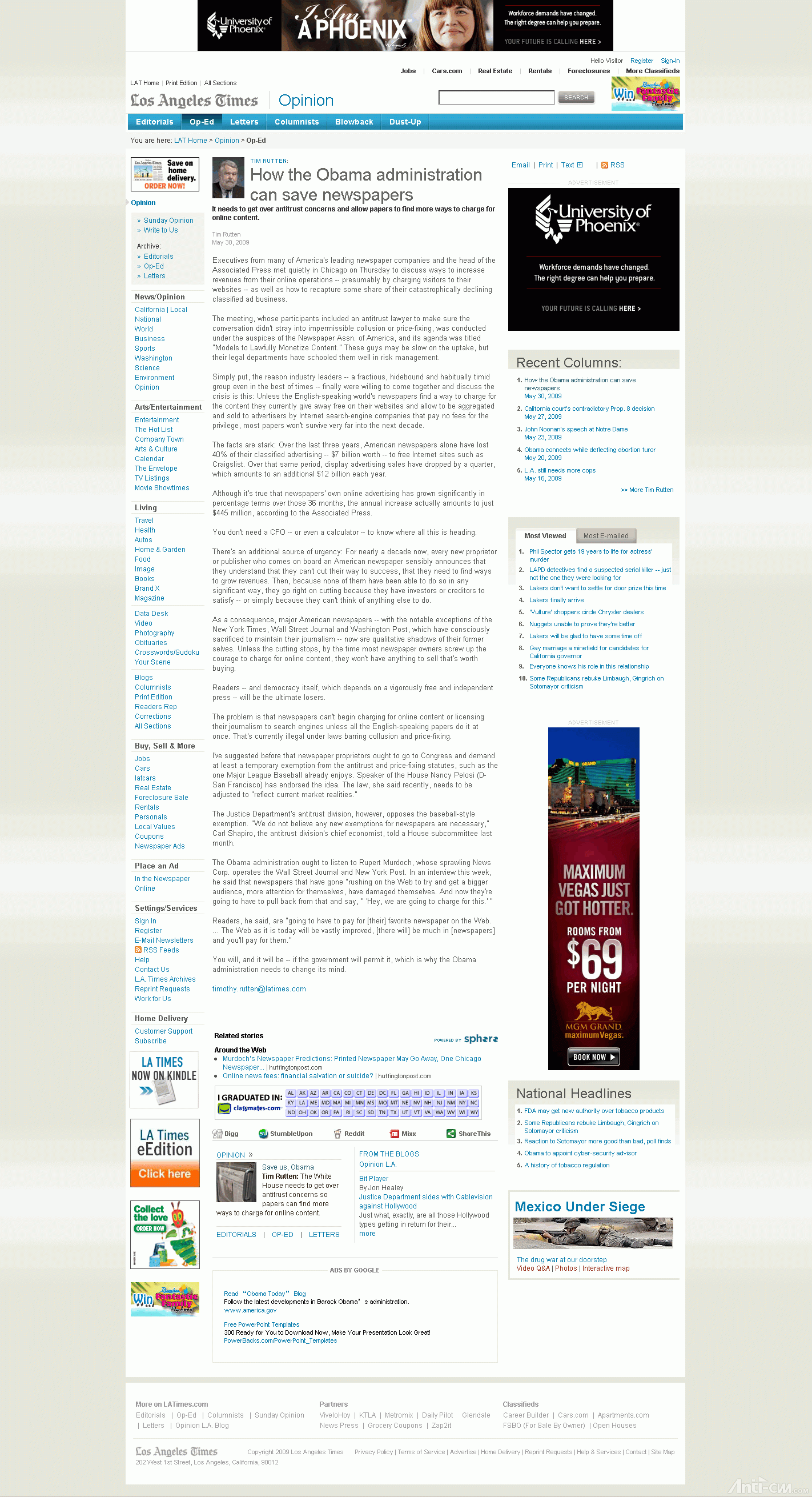|
|
本帖最后由 I'm_zhcn 于 2009-6-1 00:33 编辑
How the Obama administration can save newspapers
http://www.latimes.com/news/opinion/commentary/la-oe-rutten30-2009may30,0,584251.column
Tim Rutten May 30, 2009
It needs to get over antitrust concerns and allow papers to find more ways to charge for online content.
Executives from many of America's leading newspaper companies and the head of the Associated Press met quietly in Chicago on Thursday to discuss ways to increase revenues from their online operations -- presumably by charging visitors to their websites -- as well as how to recapture some share of their catastrophically declining classified ad business.
The meeting, whose participants included an antitrust lawyer to make sure the conversation didn't stray into impermissible collusion or price-fixing, was conducted under the auspices of the Newspaper Assn. of America, and its agenda was titled "Models to Lawfully Monetize Content." These guys may be slow on the uptake, but their legal departments have schooled them well in risk management.
Simply put, the reason industry leaders -- a fractious, hidebound and habitually timid group even in the best of times -- finally were willing to come together and discuss the crisis is this: Unless the English-speaking world's newspapers find a way to charge for the content they currently give away free on their websites and allow to be aggregated and sold to advertisers by Internet search-engine companies that pay no fees for the privilege, most papers won't survive very far into the next decade.
The facts are stark: Over the last three years, American newspapers alone have lost 40% of their classified advertising -- $7 billion worth -- to free Internet sites such as Craigslist. Over that same period, display advertising sales have dropped by a quarter, which amounts to an additional $12 billion each year.
Although it's true that newspapers' own online advertising has grown significantly in percentage terms over those 36 months, the annual increase actually amounts to just $445 million, according to the Associated Press.
You don't need a CFO -- or even a calculator -- to know where all this is heading.
There's an additional source of urgency: For nearly a decade now, every new proprietor or publisher who comes on board an American newspaper sensibly announces that they understand that they can't cut their way to success, that they need to find ways to grow revenues. Then, because none of them have been able to do so in any significant way, they go right on cutting because they have investors or creditors to satisfy -- or simply because they can't think of anything else to do.
As a consequence, major American newspapers -- with the notable exceptions of the New York Times, Wall Street Journal and Washington Post, which have consciously sacrificed to maintain their journalism -- now are qualitative shadows of their former selves. Unless the cutting stops, by the time most newspaper owners screw up the courage to charge for online content, they won't have anything to sell that's worth buying.
Readers -- and democracy itself, which depends on a vigorously free and independent press -- will be the ultimate losers.
The problem is that newspapers can't begin charging for online content or licensing their journalism to search engines unless all the English-speaking papers do it at once. That's currently illegal under laws barring collusion and price-fixing.
I've suggested before that newspaper proprietors ought to go to Congress and demand at least a temporary exemption from the antitrust and price-fixing statutes, such as the one Major League Baseball already enjoys. Speaker of the House Nancy Pelosi (D-San Francisco) has endorsed the idea. The law, she said recently, needs to be adjusted to "reflect current market realities."
The Justice Department's antitrust division, however, opposes the baseball-style exemption. "We do not believe any new exemptions for newspapers are necessary," Carl Shapiro, the antitrust division's chief economist, told a House subcommittee last month.
The Obama administration ought to listen to Rupert Murdoch, whose sprawling News Corp. operates the Wall Street Journal and New York Post. In an interview this week, he said that newspapers that have gone "rushing on the Web to try and get a bigger audience, more attention for themselves, have damaged themselves. And now they're going to have to pull back from that and say, " 'Hey, we are going to charge for this.' "
Readers, he said, are "going to have to pay for [their] favorite newspaper on the Web. ... The Web as it is today will be vastly improved, [there will] be much in [newspapers] and you'll pay for them."
You will, and it will be -- if the government will permit it, which is why the Obama administration needs to change its mind.

|
How, newspapers, Obama, save, 洛杉矶时报, How, newspapers, Obama, save, 洛杉矶时报, How, newspapers, Obama, save, 洛杉矶时报
|